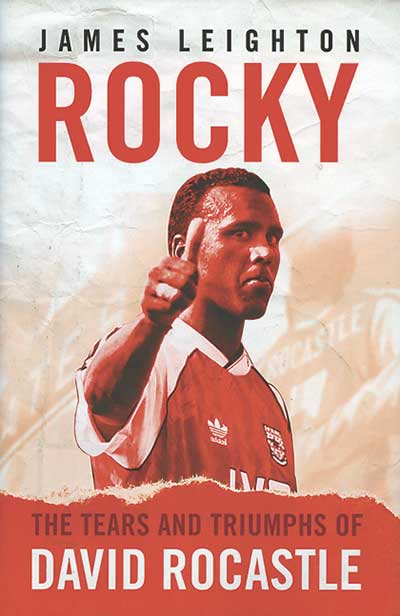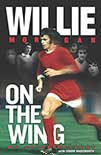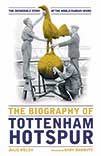Search: ' George Graham'
Stories
 The tears and triumphs of David Rocastle
The tears and triumphs of David Rocastle
by James Leighton
Simon & Schuster, £18.99
Reviewed by David Stubbs
From WSC 355 September 2016
David Rocastle commands enormous affection among Arsenal fans, who have a special fondness for their underachievers; Charlie Nicholas and John Jensen spring to mind also. In Rocastle’s case, he was luckless with injuries over the course of his career and, sadly, suffered the supreme misfortune of dying in 2001 aged just 33 of Non-Hodgkin lymphoma. In the decade he spent at Arsenal, however, he is remembered as a player who on his day was able to conjure flashes of Brazilian-style magic for an Arsenal team whose success was generally earned, under George Graham, through more pragmatic means.
 by Willie Morgan with Simon Wadsworth
by Willie Morgan with Simon Wadsworth
Trinity Mirror, £16.99
Reviewed by Graham McColl
From WSC 326 April 2014
If the purpose of this book were to rid Willie Morgan of the image of being George Best’s doppelganger, it sets about it in a strange fashion. Behind the main picture on the cover, faint background images show Morgan at various stages of his life from babe to footballer but, inexplicably, the only other person amid these images is Best, Morgan’s late 1960s and early 1970s fellow winger at Manchester United. On the inside back flap, there is a picture of Morgan in a United strip… along with Best. Inside the book there is only one advertisement for another publication – a page-sized promotion for The Best of Best, a “souvenir magazine” from the Daily Mirror that boasts “lost images” of “The Genius As You’ve Never Seen Him Before”.
George is given further prominence once the story begins, receiving a mention on more than 40 pages. Yet in Bestie, George’s own 1998 authorised biography, Morgan features only twice, both times derogatorily. “Morgan always seemed a bit jealous,” Georgie says. Morgan, in contrast, on first mention of Best, says, touchingly, that their lives would be “intertwined”.
Pushing this book on the back of Best, as someone has decided to do, is unnecessary. Morgan is an engaging storyteller, a happy-go-lucky individual with an underlying toughness forged, as he relates in excellent detail, through his upbringing in Sauchie, the Clackmannanshire mining village. He is also capable of some fabulous self-promotion: “Along with Geroge Best [who else?], I was one of the two biggest stars in football,” he says of mid-1968 – the era of Eusébio, Bobby Charlton, Bobby Moore, Jimmy Johnstone, Pelé, Denis Law et al.
One early inconsistency almost brings the tale to a shuddering halt, though. Willie states that his dad, after a theological dispute with a Canon Matthews in Sauchie when Willie was around 12, had “wanted to kill” Matthews, and never went to church again. Yet, when Willie turns 15, his dad keeps him on at school, on the advice of a priest, rather than sending him down the pit, because: “My dad was never one to go against the wishes of the church.” This seeming inconsistency is more than a pedantic niggle. If Willie goes down the mine, he doesn’t play schools football, doesn’t get spotted by Burnley FC, doesn’t become a pro footballer, doesn’t write this book.
Get over that hurdle and the book lives up to the breathless cover blurb of “hundreds of tales” about “the hell-raising Best [him again] and a host of others”, although the story of Scotland’s 1974 World Cup is shockingly light on insider detail. Things peter out with post-playing tales of socialising with people such as Rod Stewart which does at least bring some amusement, with a schoolboyishly eager Stewart asking Willie, as they attend a match, to relate each stage of his own pre-match professional routine. “I would probably be picking some horses out right now for the next race,” Morgan replies. His yarn is like that all the way through and plentifully enjoyable for it.
 by Julie Welch
by Julie Welch
Vision Sports, £20
Reviewed by Alan Fisher
From WSC 314 April 2013
The Twitter hashtag #againstmodernfootball is hardly a scientific dissection of the faults of the modern game but it has become an outpouring of genuine frustration and growing disenchantment: exorbitant ticket prices, alienated and marginalised fans, an obsession with the here and now and instant success. Julie Welch’s Biography Of Tottenham Hotspur is not only a revealing insight into the club, it could well restore your faith in football.
Welch traces the development of the club’s character and personality, showing there is more to a football club’s history than a list of players, matches and trophies. Her beloved Danny Blanchflower’s statement that it’s not just about winning, it’s about glory and doing things in style, articulates a culture and identity that dates back to the club’s formation in the 1880s, when three schoolboys met under a lamp-post 100 yards from the current ground.
Harry Redknapp and André Villas-Boas come from different schools of management but both talked of the need to play good football the Spurs way. Arthur Rowe’s pioneering “push and run” won a League title in 1951. He was influenced by another innovator, Peter McWilliam, Spurs boss in the 1920s, and in turn inspired the incomparable Bill Nicholson to bring unparalleled success in the 1960s and early 1970s. The familiar mixture of flamboyance and exasperation, the sublime and erratic, would be instantly recognisable to successive generations of Spurs fans.
We deny history at our peril. Alan Sugar saved the club but he understood the balance sheet better than his heritage, hence the crushing mediocrity of the 1990s with Christian Gross, Gerry Francis and George Graham. Then again, there’s nothing new under the sun. Financial crises, businessmen wanting to profit by moving the ground, an ability to snatch defeat from the jaws of victory: any decade at Spurs, not just the last one.
Welch is an author and screenwriter, the first woman football reporter in Fleet Street to have her own byline. She is a beguiling storyteller who tells the tale with a curiosity and style that sweeps the reader along. The air of artistry and magic seduced her as a schoolgirl but it’s not quite right to suggest they entice fans these days. Peer pressure, family ties or blind accident are more common factors. However once committed it keeps us there, becoming part of who we are.
The nature of Spurs’ identity as a Jewish club is the only omission, perhaps because although it’s an independent publication, unusually the club have co-operated and are shy of potential controversy. The absence of statistics and tables may dismay lovers of detail, who will point to several proof-reading errors.
It’s a beautiful book, wonderfully written, that is essential for Spurs fans and deserves to be widely read because it is about perspective, culture and identity, precious to fans everywhere yet under attack. Read it and I defy you to tell me that finishing fourth in the Premier League is what truly matters.
 Relations between club and fans are fraught at Arsenal, where a new stadium has left some feeling short-changed, reports Matthew Bazell
Relations between club and fans are fraught at Arsenal, where a new stadium has left some feeling short-changed, reports Matthew Bazell
A lot of accusations have been levelled at Arsenal fans recently, claiming we are a spoilt bunch of ingrates who have no right demanding better from our team. We are told we should be happy where we are because things could always be worse. I do not go to games any more, partly because modern-day prices are a rip-off, but when I put myself in the position of Arsenal season ticket holders I came to the conclusion that, if I spent that kind of money for admission, I too would be incredibly demanding.